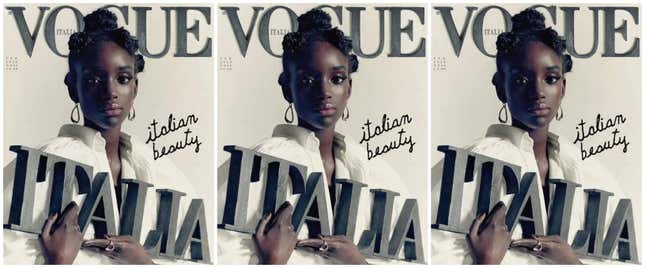
One day in July 2017, I was leading a media studies class I teach every summer in Rome on a field trip to the television studios of RAI, Italy’s national broadcasting company. The group was very international, comprised of local and study-abroad students representing six nationalities and a kaleidoscope of ethnic heritages. We were traveling by public transportation from our university in central Rome to a district just north of the city limits, and at one tricky transfer point, I was a little uncertain about which turn to take. Without hesitation, a native Roman in the group who happened to reside close to our destination took charge of the expedition and led us in the right direction. That she was born and raised in Rome of Liberian parents added meaning and value, since national belonging and authority had become such contested claims in Italy.
I was reminded of this moment when I saw the February issue of Vogue Italia. Gracing the cover is a singularly striking model named Maty Fall Diba, who was born in Senegal and grew up in the northern Italian city of Chiampo. Other women of color have preceded Diba onto this coveted spot, but Diba is the first in history to also hold Italian citizenship. Announcing this milestone, the doe-eyed model is photographed holding the word “Italia” to her breast as if she’s taking the oath of allegiance then and there. And if you somehow miss that declaration, written beside her in uncapitalized childlike lettering are the words “italian beauty.”
With this cover, Vogue Italia is wading into troubled waters. The question of who is or isn’t Italian is a very heated debate these days. Throughout the twentieth century, this Mediterranean nation of now 61 million inhabitants grew accustomed to its citizens emigrating in shiploads in search of economic opportunity elsewhere. But in the last thirty or so years, the reverse trend has accelerated, bringing increasing numbers of immigrants from primarily Africa, Asia, Eastern Europe, and Latin America. Their children, either brought with them at an early age, like Diba, or born on Italian soil, like my former student, are now lobbying to change the law so that they will be acknowledged as Italians sooner.
Italian nationality law is based on ius sanguinis, Latin for “right of blood,” not ius soli, meaning “right of soil,” or the right to citizenship by being born in a country. This means that people born in Italy to immigrant parents are not granted citizenship at birth; they must wait until they are 18 to apply for it. As for immigrants who arrived as children, the wait time for eligibility to apply for citizenship is ten years of uninterrupted residency, according to the Italian Association for Juridical Studies on Immigration, whereas in many other western countries it is as much as half that time.
Two additional principles have been proposed by politicians: ius culturae and ius soli temperato. According to the former, minors born in Italy of non-Italian parents, or who arrived before their twelfth birthday could take out citizenship if they have completed a minimum of five years of schooling in the Italian education system. Under the latter, a child born in Italy automatically becomes Italian if at least one parent has been legally residing in Italy for a minimum of five years. Both ius culturae and ius soli take the residency status of the parents into consideration in determining the eligibility of the applicant.
Writing in the Milan-based online magazine Mattlumine in June 2017, one journalist described ius soli as “the expression in vogue in recent days.” As of October, 2019, the Italian parliament was considering three separate citizenship reform proposals based on incorporating ius soli with the other principles of citizenship. But, nobody in Italy is holding their breath for a decision anytime soon. Diba went the existing legal route; she became a citizen by application in May, 2019, after having resided in Italy since age 9 with her Senegalese father, who has held an Italian residency permit for over two decades.
A comprehensive survey of citizenship and nationality laws of the countries of the world published by the Library of Congress in 2018 shows that ius soli is practiced primarily in countries in the Americas. At present, there is no country in Europe that recognizes unconditional birthright citizenship.
Immigration reform activists such as Anna Maria Gehneyi say the Italian nationality law is excessively stringent, even racist. As of 2018, there were over 1.3 million second-generation immigrants without citizenship living in Italy, according to a report by the Rome-based IDOS Study and Research Centre. Seventy-five percent were born in Italy and 25 percent moved there at a very young age. “If the law of Ius Soli is not approved,” Gehneyi wrote in a 2017 article in the Italian daily newspaper Corriere della Serra, “all Italians are bankrupted, none excluded.” Gehneyi, now in her mid-twenties, is also a musical artist who performs under the name Karima 2G, which stands for “second-generation.” She is also the former student of mine who guided us through her home turf that day.
Another strong voice in the reformist movement is Bolognese-born filmmaker Fred Kudjo Kuwornu. His 2011 documentary 18 Ius Soli explores the existing legislation’s impact on the lives of 18 Italian adolescents born to non-Italian parents. As the son of a Ghanaian father and Italian mother, Kuwornu, 48, never had to deal with this problem himself, an inequity he says fueled his commitment to challenging the law (h/t NuoveRadici.World).
Grassroots organizations such as the National Coordination of the New Italian Generations have formed to lobby for citizenship reform. Last year, it put out a 30-page manifesto (pdf), officially calling on the powers that be to implement sweeping changes that would guarantee them integration into Italian society, beginning with birthright citizenship.
On this question, Italian lawmakers are fiercely divided. Over the past decade, politicians have made statements or gestures both pro and con. A former president, Giorgio Napolitano, said of the law, which was adopted in 1992, “Denying citizenship is a true folly, an absurdity.” And last year, Leoluca Orlando, the mayor of Palermo, conferred honorary citizenship on 71 schoolchildren in the category in a show of solidarity. In 2017, during one round of parliamentary proceedings over the question, a violent scuffle broke out, with chairs thrown and wrists sprained. When former Minister of Integration Cecile Kyenge, Italy’s first and only-ever black government minister, introduced a proposal to adopt ius soli, she drew the wrath of the nationalist Lega party, led by the ferociously anti-immigrant minister Matteo Salvini, who passed measures further tightening citizenship criteria which took effect in December 2018.
Throughout the unfolding of this conflict, citizenship rights and physical appearance have walked hand in hand. One Lega minister, Roberto Calderoli, said, “I love animals—bears and wolves, as is known—but when I see the pictures of Kyenge I cannot but think of the features of an orangutan, even if I’m not saying she is one.” And just this month, after the release of the Vogue Italia cover, Daniele Beschin, another councilor belonging to the Lega party, stated, predictably, that Diba could never be considered “a genuine Italian beauty” because her skin is not white (h/t the Italian Insider). Beschin was subsequently terminated from his position; however, he maintains that this was due to internal party politics, not his comment.
What is the Italian public’s attitude towards ius soli? According to the results of a poll commissioned by the left-leaning newspaper La Repubblica released this past November, 70 percent are in favor of ius culturae, while over 50 percent oppose ius soli. The findings of a different survey released the same month offer a bleak picture of attitudes towards race relations in general. In a sample of 1,500 Italians, 10 percent said racist acts were always justified, 45 percent said racist acts could be acceptable depending on the situation, while only 45 percent said racist acts of any kind were completely unacceptable.
The fashion world is now responding to the ius soli debate in the way it does best, by distributing seductive imagery. Vogue Italia is not the first fashion media company to lend support to the citizenship reform movement; in August 2019, fashion brand Valentino launched a global advertising campaign for its “Born in Roma” fragrance starring Adut Akech, a Sudanese-born Australian beauty. When I was passing through Rome’s Fiumicino International Airport this past November, I saw the campaign on continuous replay on giant monitors for all 121,000 of the airport’s estimated daily travelers to see.

What did this image say to those travelers of all nationalities and citizenship statuses—those who show their passports without a second thought, and those who cannot? Like on that day back in 2017, I pondered what direction the message might lead.

